Interview: John Douglas Thompson On Providing a More Thorough Perspective of William Jennings Bryan in INHERIT THE WIND
A re-imagined production of Jerome Lawrence & Robert E. Lee’s Inherit the Wind is currently playing on the Pasadena Playhouse stage, just extended thru December 3rd
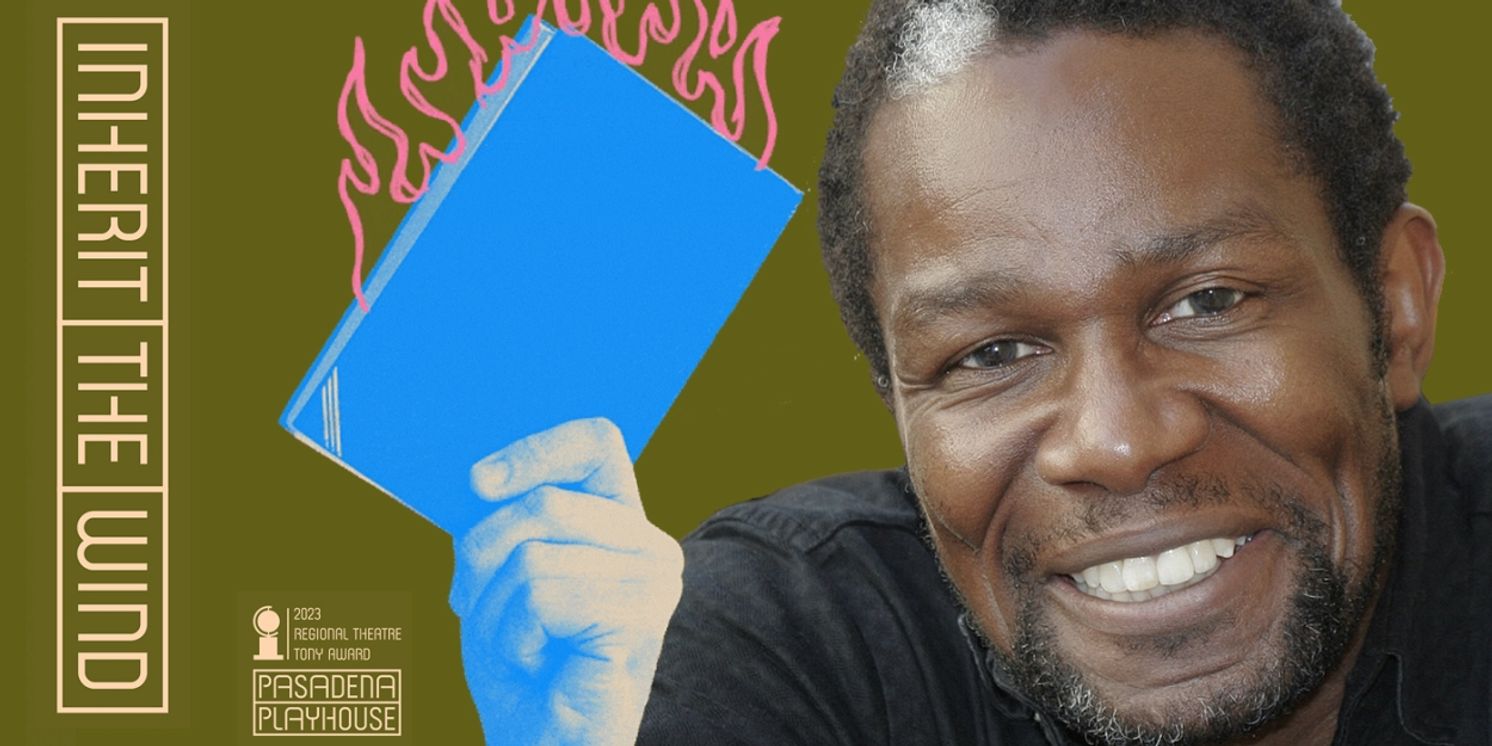
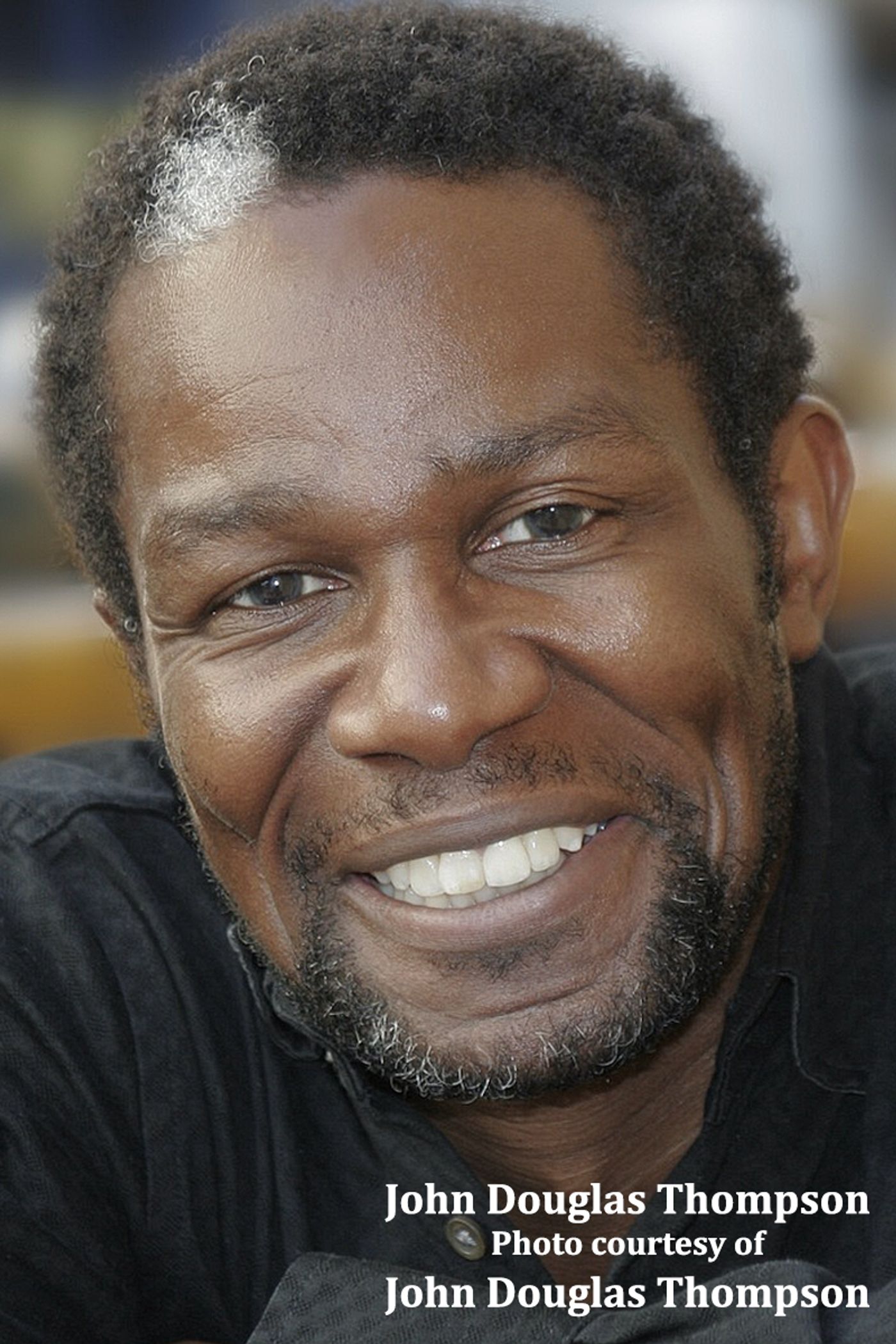
A re-imagined production of Jerome Lawrence and Robert E. Lee’s Inherit the Wind is currently playing on The Pasadena Playhouse stage, just extended through December 3, 2023. Michael Michetti directs the cast, led by Alfred Molina & John Douglas Thompson as the battling lawyers in a trial inspired by the Scopes Monkey trials in 1925. Rounding out the talented company: Chris Perfetti, Abubakr Al, David Aaron Baker, Rachel Hilson, Jared, Brian Calì, Marlene Forte, Matt Gomez Hidaka, Thomas Hobson, Michael Kostroff, John W. Lawson, Philip J. Lewis, Gabriella Pizzigoni, Rene Rivera and Pam Trotter. After the whirlwind of opening night and unexpected COVID cancellations, John Douglas graciously found some time to chat with me on the phone.
Thank you for taking the time for this interview, John Douglas! I saw your show opening night and you all were so intense and incredible.
Thank you! I'm really proud of it. I'm not familiar with the movie. I've never seen a production of the play, but I am familiar obviously with the ideas behind it. I did quite a bit of research about the Scopes Trial. And there was just a lovely book called Summer of the Gods by Edward J. Larson. Pulitzer Prize winning book and it's fascinating because it gives you all of the issues that were happening in America that preceded the Scopes Trial issues - socially, politically and economically.
You picked up this book when you started doing this show, right?
I picked up the book as we were here in L.A. rehearsing it. Prior to getting to Los Angeles, all I had was the script and your basic information that you can find anywhere on the Scopes Trial, but I wanted something with a lot more depth and coverage and insight into my character Matthew Harrison Brady which is based on William Jennings Bryan. I wanted much more insight into him and also into the trial itself and all the events that surrounded the trial. So, this book was perfect, probably the best thing anyone could actually read who wants to know more about America and the Scopes Trial.
What qualities of your character Matthew Harrison Brady did you immediately relate to?
I think there's a great deal of humanity in Matthew Harrison Brady, that he really cares. He cares for the people. His relationships with the people are not transactional. It's not just a political thing. It's not a way of getting votes or a popularity contest. It's really an opportunity to connect with the people and to advocate for them and to be their advocate. So that I connected with and that's something that maybe you might not know about this particular character; because the way it's been portrayed perhaps in the past, I'm sure within the context of the movie, you may not get the sense of whom he really was and what he really meant to America - quite famous, and quite popular. The main thing people said about him, ‘He was a great commoner.’ He spoke for the common man and he represented the majority. He was quite progressive in some of his ideas, and what he did within the context of government. It wasn't as if he was a famous lawyer on the level of Clarence Darrow. What William Jennings Bryan was or (i.e., what Matthew Harrison Brady was) was a great politician who worked for the people and got through a lot of progressive legislation in this country that helped the people. He got turned on, obviously to this religious issue. He was very religious himself. He was drawn into this battle between fundamentalism and progressivism. He wasn't like a naturally born lawyer. He did a lot of speeches at Chautauqua tents, which was like the main way many various ideas (political, economic, religious) were spread. He was an incredibly live speaker, and a fascinating and worthy politician who ran for president three times. Matter of fact, his first time he ran, he was 36 years, so he still is the youngest person ever to run for president in this country's history. There's a lot you don't get from the play, so I wanted to combine that I had in the play with the real character or the real individual himself. And then bring that forward in the context of a production. To whatever degree I can as an actor to shed some light on Matthew Harrison Brady. and bring some humanity to the character, so that other sides can be seen of him. That's what I'm trying to do. That's my job, I guess.as a craftsman.
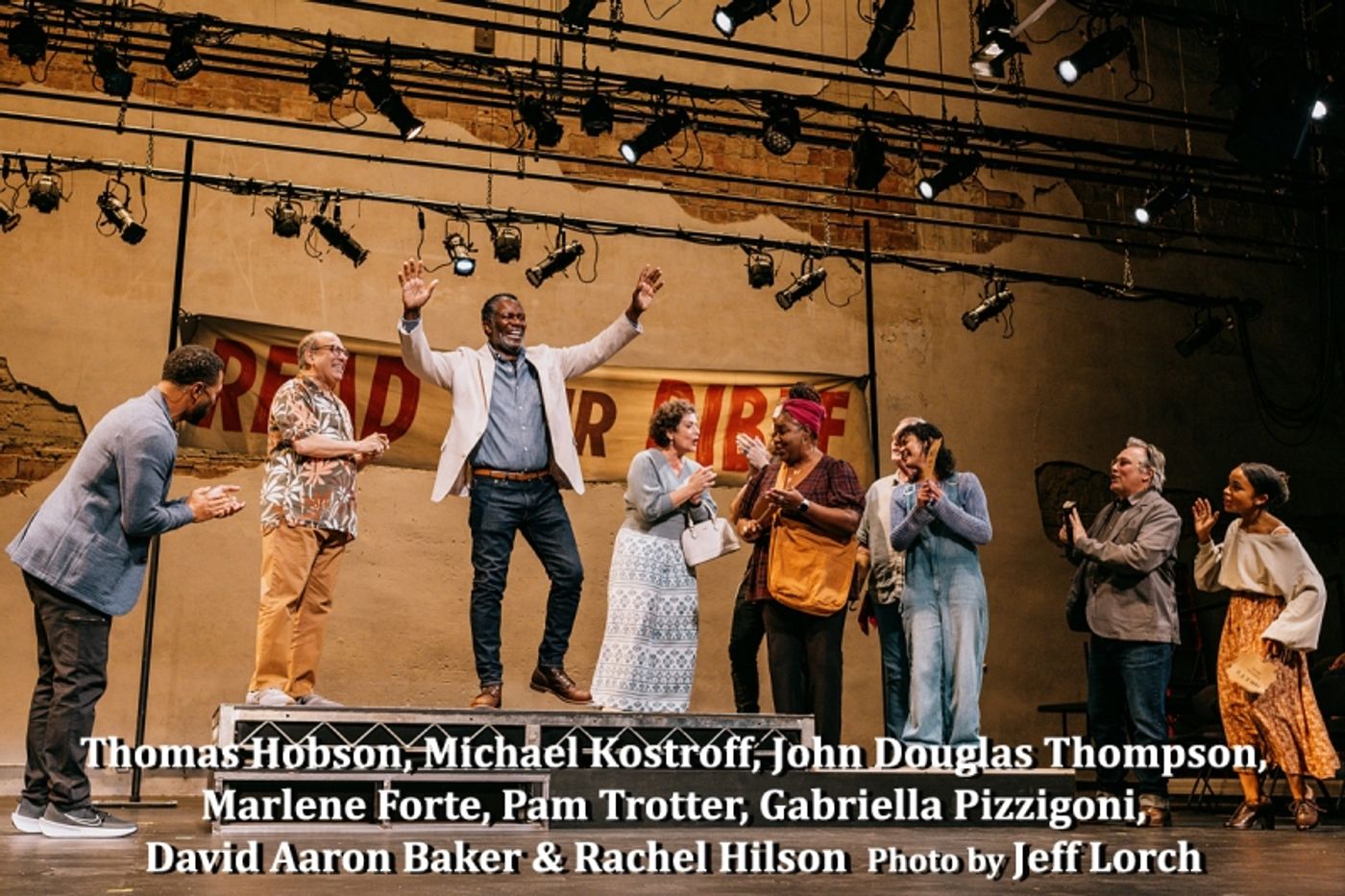 What idiosyncrasies of his did you have to wrap your head around to portray him authentically?
What idiosyncrasies of his did you have to wrap your head around to portray him authentically?
Well, that's a good question. Idiosyncrasies. Oddly enough, I didn't necessarily find any idiosyncrasy. I knew where he was coming from. I understood him, although he's not of my politics. I'm very much a liberal and I am very much a free thinker and very much a progressive, individual. And, obviously, if there was any idiosyncrasy that I had to wrap my mind around, if we want to call it an idiosyncrasy was his passion for fundamentalism. You might call it majoritarianism when you follow the majority. He believed in majority rules. And the whole thing about teaching religion in the schools that was what the people wanted, what the citizens of the towns and the cities wanted. They were the taxpayers, so they should have the right to determine what is being taught to their children. You hear that same argument now. It's a very topical contemporary argument as we go around the country, but he’s a strong advocate for fundamentalism, if you want to call it an idiosyncrasy is something I had to wrap my mind around. But the way in which I wrap my mind around that was just in the realization that he really cared about the people he represented. I just wanted to give him some humanity that he really cared about these people. That's why he fought so hard for them. It was never against his own best interest because he believed in what he was talking about and what he was doing. But it could have turned out to be his Achilles’ heel, right? That he was so fundamental. But behind the fundamentalism is this deep care and concern and love for the common man, and that was something I could buy into. That made him extremely legitimate. And actually a giant, a really wonderful man, in my opinion, because the impetus of all of his actions was for the people. His nickname was ‘The Great Commoner.’ People flocked to hear his speeches because he was advocating for them at all times.
So you're saying that Matthew wasn't a real lawyer?
He wasn't a lawyer, per se. No, he was a politician. Definitely a politician. But he was the great proponent of the people. And he was great proponent of fundamentalism, or having religion taught in the schools. And so they put him forward and said, ‘You'd be best to represent that argument in this particular Scopes Trial case.’ He wasn't some lawyer like Clarence Darrow going around the country, taking on these famous cases, sometimes celebrity cases and maybe winning them or advocating for, you know, these celebrities or adjudicating for them or whatever you want to say. He was much more a politician. I said previously, he ran for president three times. He was a member of Woodrow Wilson's cabinet until he left that. He was deeply into politics and fighting for the common man, and they certainly knew he was the most qualified to take on the argument of fundamentalism, versus progressivism, or fundamentalism versus Darwinism.
So your character had no qualms about going against going up against Alfred Molina's character who was a real lawyer.
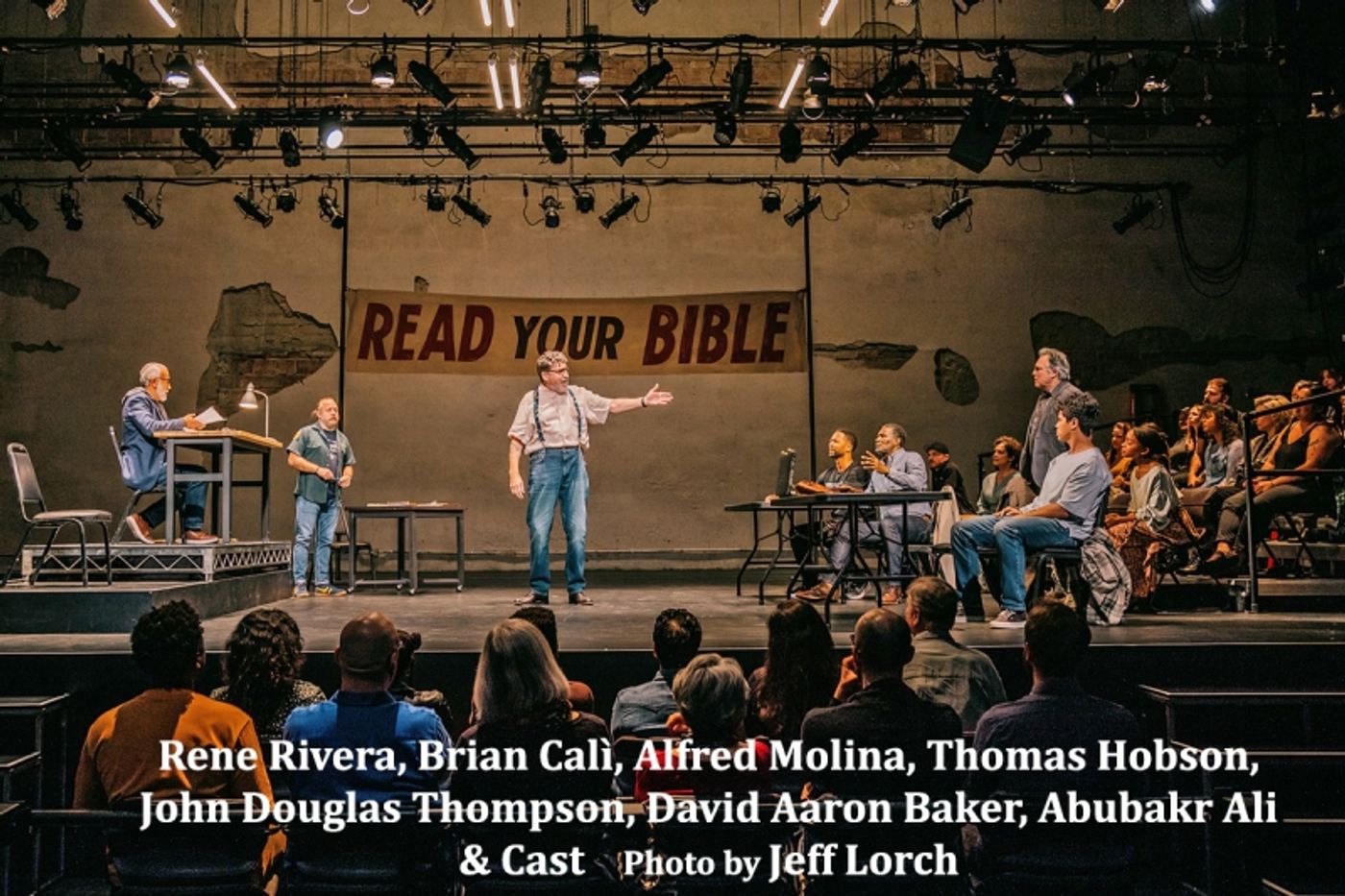 No, I don't think he had any qualms at all and certainly thought that this was a battle that he could win. Because at the time, certainly with Darwinism, there was still many questions. It was still considered to many people still hypotheses. Albeit it was being taught to a certain degree, it didn't have a solid foundation. And it was all fossils. It needed all that development of fossil findings to actually make it substantive. Particularly for scientists who were studying it and looking at the book and trying to figure out what this was. It was the discovery of many different types of fossils that helped give that book and what it was talking about a strong foundation. I think also for Matthew Harrison Brady the idea of Darwinism in schools because you gotta understand it's survival of the fittest, right? And if that's what you're going to teach, it's almost it's built in obsolescence as it relates to Christianity. It is at total odds with the teachings of the Bible. Morally Darwinism is bankrupt, as it relates to Christianity and if this is what we're going to teach our kids survival of the fittest. Well, what is that going to do? What is that going to do to our children? What is that going to do to our lives? What is that going to do to our country? So that's where you know Matthew Harrison Brady was most concerned. It wasn't a fight just to be in a fight with Clarence Darrow, Henry Drummond. It was really about saying, ‘Listen, Darwinism is its thing, but it's the wrong thing to be teaching to our children. It's the wrong thing to be a part of the educational system for two reasons, survival of the fittest and secondly, it should be majority rules.’
No, I don't think he had any qualms at all and certainly thought that this was a battle that he could win. Because at the time, certainly with Darwinism, there was still many questions. It was still considered to many people still hypotheses. Albeit it was being taught to a certain degree, it didn't have a solid foundation. And it was all fossils. It needed all that development of fossil findings to actually make it substantive. Particularly for scientists who were studying it and looking at the book and trying to figure out what this was. It was the discovery of many different types of fossils that helped give that book and what it was talking about a strong foundation. I think also for Matthew Harrison Brady the idea of Darwinism in schools because you gotta understand it's survival of the fittest, right? And if that's what you're going to teach, it's almost it's built in obsolescence as it relates to Christianity. It is at total odds with the teachings of the Bible. Morally Darwinism is bankrupt, as it relates to Christianity and if this is what we're going to teach our kids survival of the fittest. Well, what is that going to do? What is that going to do to our children? What is that going to do to our lives? What is that going to do to our country? So that's where you know Matthew Harrison Brady was most concerned. It wasn't a fight just to be in a fight with Clarence Darrow, Henry Drummond. It was really about saying, ‘Listen, Darwinism is its thing, but it's the wrong thing to be teaching to our children. It's the wrong thing to be a part of the educational system for two reasons, survival of the fittest and secondly, it should be majority rules.’
If the taxpayers of this city or this county, want religion taught in the schools, then that should be the rule. If the taxpayers wanted Darwinism taught in the school system, I guess then that would be the rule but that's not what was happening. When Darwinism was taught, this was fringe in essence. There was more teaching of religion in the schools than there was Darwinism. So he was just basically saying, ‘Well, what do the parents want who send their kids to the schools? They want them learning Christianity, or survival of the fittest?’
What aspects of Inherit the Wind initially enticed you to become involved?
For me, it was what happens to Brady, that the arc of his journey and the arc of his character was really fascinating to me. It's like a Greek trauma. What happened to him? I've been keen sometimes when I choose roles in what I'm looking for. What scares me or what engages me and makes me say, ‘Yes.’ And there was this really wonderful quote, by Eugene O'Neill. I've done a couple of Eugene O'Neill's plays. I'll read it to you, called The Tragedy of Man. ‘And this is the tragedy of man is perhaps the only significant thing about what I am after, is to get the audience leaving the theater, with an exalted feelings from seeing somebody on stage, facing lives, fighting against the eternal odds, not conquering, but perhaps inevitably being conquered. The individual life is made significant just by the struggle.’ So that's what I look for. And an Achilles’ heel, you know, whatever it is, that brings down the giant. But definitely, the idea of one of the most salient things about man is to tragedy that is man from watching someone on stage or on film, struggling against these eternal odds and sometimes not to conquer them, but to lose to them. To be conquered by them, and then you really get the picture of a person, you know what I mean? Not so much from the win, but sometimes from the loss. That was like with other characters I've played with. any of these Shakespearean roles, non-Shakespearean August Wilson falls into that as well. It's just there's a great level of dynamism. These characters seem so incredibly dynamic to me, and so challenging that I'm terrified of trying to step in their shoes. But that's when I know that when that's when I need to step try to step into those shoes.
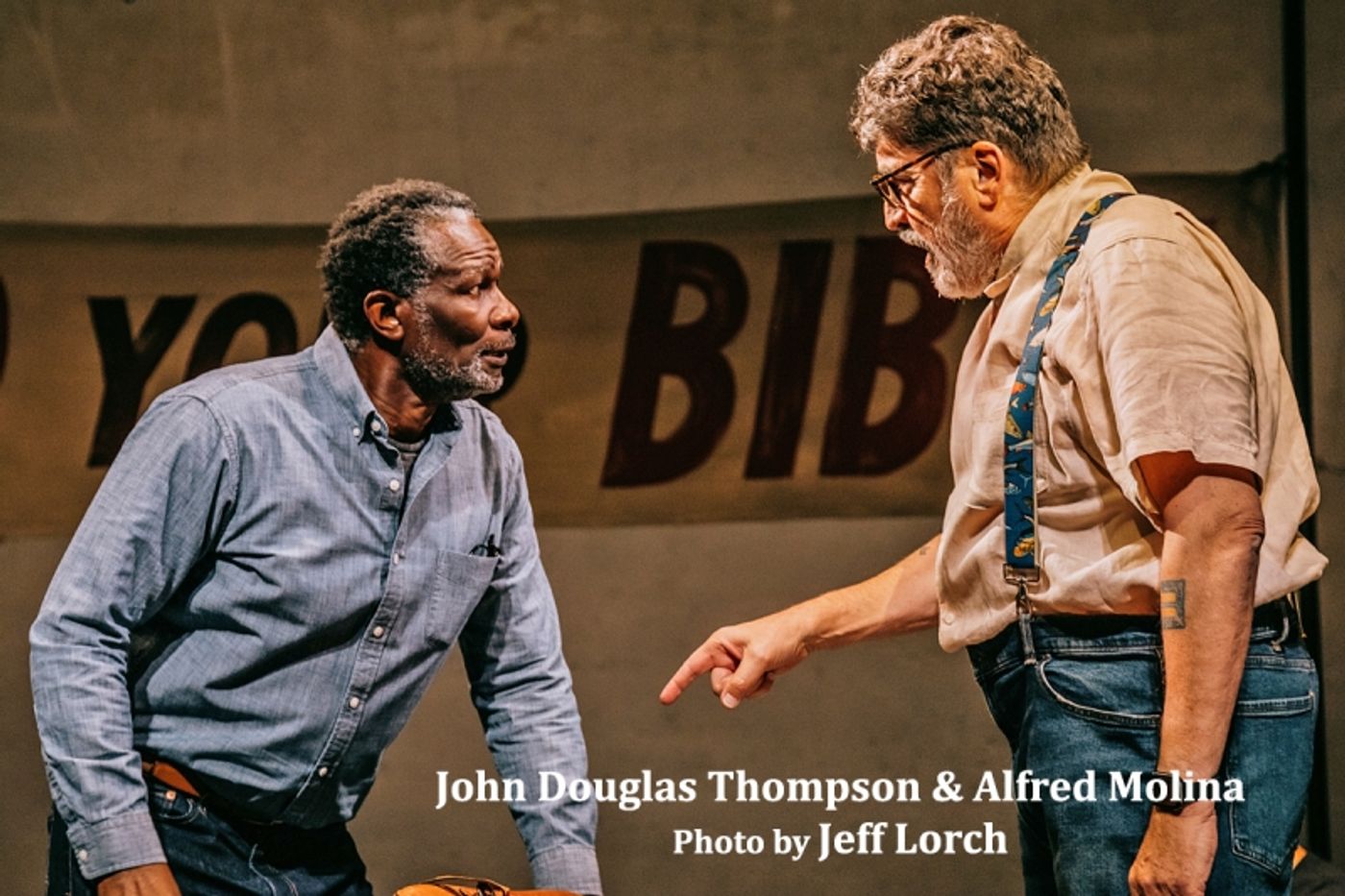 What’s it like to spar with Alfred Molina?
What’s it like to spar with Alfred Molina?
It's great. I mean, we have such a fun time. Because we never know what's going to happen. You know, although we know what's going to happen. We really never know what's going to happen. It's like two boxers sparring, not even sparring but in a championship fight. One round goes to me, one round goes to him and we're just battling it out trying to win. What I really enjoy about Alfred is we both have an easy approach to it. And we just let it go where it goes. Just let the scene happen to us and we play it. We don't have anywhere to go. it's just becomes very exciting and I enjoy that boxing match with him because he's obviously a broken boxer. We really wanted to show this idea of their friendship, within the context of the production, that they used to be really good friends and worked together. Now they're on opposite sides and how is that friendship going to affect the outcome of the play or the outcome of the trial? Or how is that going to play into the trial? Just to give the relationship and the trial, even more dimension that these are just two lawyers so to speak, on opposing sides.
Does the staging distract you? Or is it just another challenge to be dealing with the audience as a jury and courtroom spectators on stage?
Oh, no, I think it brings the audience, obviously closer to the action. It makes the whole setting not just for the jury and for the audience on stage, but for the audience beyond the jury. It makes the play even more intimate and extremely relational. It just opens up to something quite modern, something quite contemporary. Having the jury with us there in the audience on stage plays into that. I think those people that get those seats, enjoy seeing and being in the show from that perspective, a unique perspective and I would welcome those audience members to come back and see it from other perspectives as well. General audience or if you were, if you can get into jury box, get into jury box. Those that were in the jury if you can get on the audience on stage. There's basically three seating areas which gives you three different perspectives of the show from an audience. Now for us as actors on stage. We love it. I love it. The people that are right there with you, you can talk to, they’re representatives of the Hillsborough community, because that’s what they are, the jury. The onstage audience are like other people from Hillsborough. For me, it’s the sense of community and the closeness to the action that we can bring the audience into and that the audience can feel that they are a part of. I really enjoy that. Sometimes I wish I was in their place. I wish I could sit and watch.
Your theatrical resume’s packed with Broadway and Off-Broadway shows. Is this Pasadena Playhouse production your first foray into the Los Angeles theatre scene?
No, I did a production of Joe Turner's Come and Gone at Mark Taper Forum. I also did a production of Satchmo, which is a one-man play about Louis Armstrong, at Wallis Annenberg in Beverly Hills. So this is my third.
You graduated from Le Moyne College in Syracuse, New York with a concentration on marketing and business. What did you want to be growing up? Was acting ever in your youthful brain?
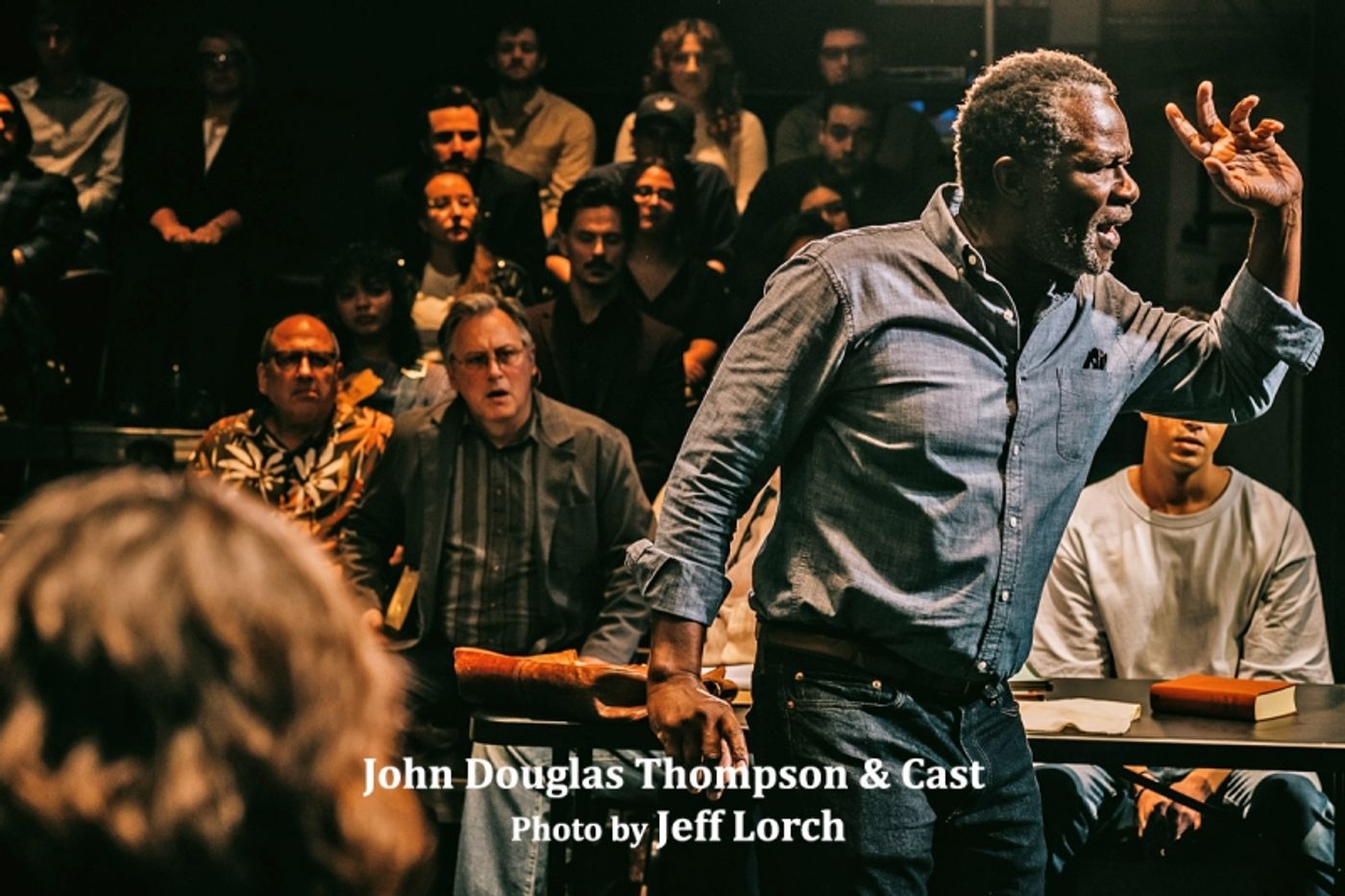 No, I was prepared to be a corporate businessman for my adult life. It wasn't until I went on a date. I was stood up. The date never showed up. And the date was to go to see a play August Wilson's Joe Turner's Come and Gone. I went to the play by myself. I watched the play, and I was quite moved by it and knew in that moment, that that's what I was supposed to be doing. I was selling computers. That was not what I was supposed to be doing with my life. Acting was. Then the journey became, how do I become an actor, so I can do what I saw on stage in that wonderful play that made me want to be an actor.
No, I was prepared to be a corporate businessman for my adult life. It wasn't until I went on a date. I was stood up. The date never showed up. And the date was to go to see a play August Wilson's Joe Turner's Come and Gone. I went to the play by myself. I watched the play, and I was quite moved by it and knew in that moment, that that's what I was supposed to be doing. I was selling computers. That was not what I was supposed to be doing with my life. Acting was. Then the journey became, how do I become an actor, so I can do what I saw on stage in that wonderful play that made me want to be an actor.
That's the play that sparks your acting bug?
Absolutely! And then, you know, it was 25 years, almost to the day, that I got a chance to do it at Mark Taper Forum. Felicia Rashad directed the production. She cast me in the role that was so pivotal when I saw the play initially at Yale Rep, which is now where I teach. So life is full of circles.
Any theatrical roles you would love to sink your acting chops into?
I would love to do Willy Loman obviously in The Death of a Salesman. I'd love to do King Lear. I'd love to take a couple more whacks at Othello. Those are high on my list of roles that I'd like to play sooner rather than later. I would do Shakespeare in particular. Each time you come to it, you're a different person. You've grown, you've matured. You're hopefully better at your craft and then that play has even more to reveal to you the second, third, fourth, fifth time around. When you approach it, you know what I mean? Those roles grow with you and help shape you and define you as an actor.
What’s in the near future for John Douglas Thompson?
I have no idea. The strikes are over, so hopefully something nice is coming my way. After this job I'm heading back to New York. Come late 2025, I'm going to be doing Shylock and Merchant of Venice at the Royal at the Royal Lyceum Theatre in Scotland.
Have you been to Scotland?
No, I have not. This will be the first time. It's a production I did here in New York and also in Washington, DC. We worked out a transfer to the Royal Lyceum and then they're going to transfer something back to New York. That's the only thing on my docket. Hopefully it'll fill up before I hang up this phone call.
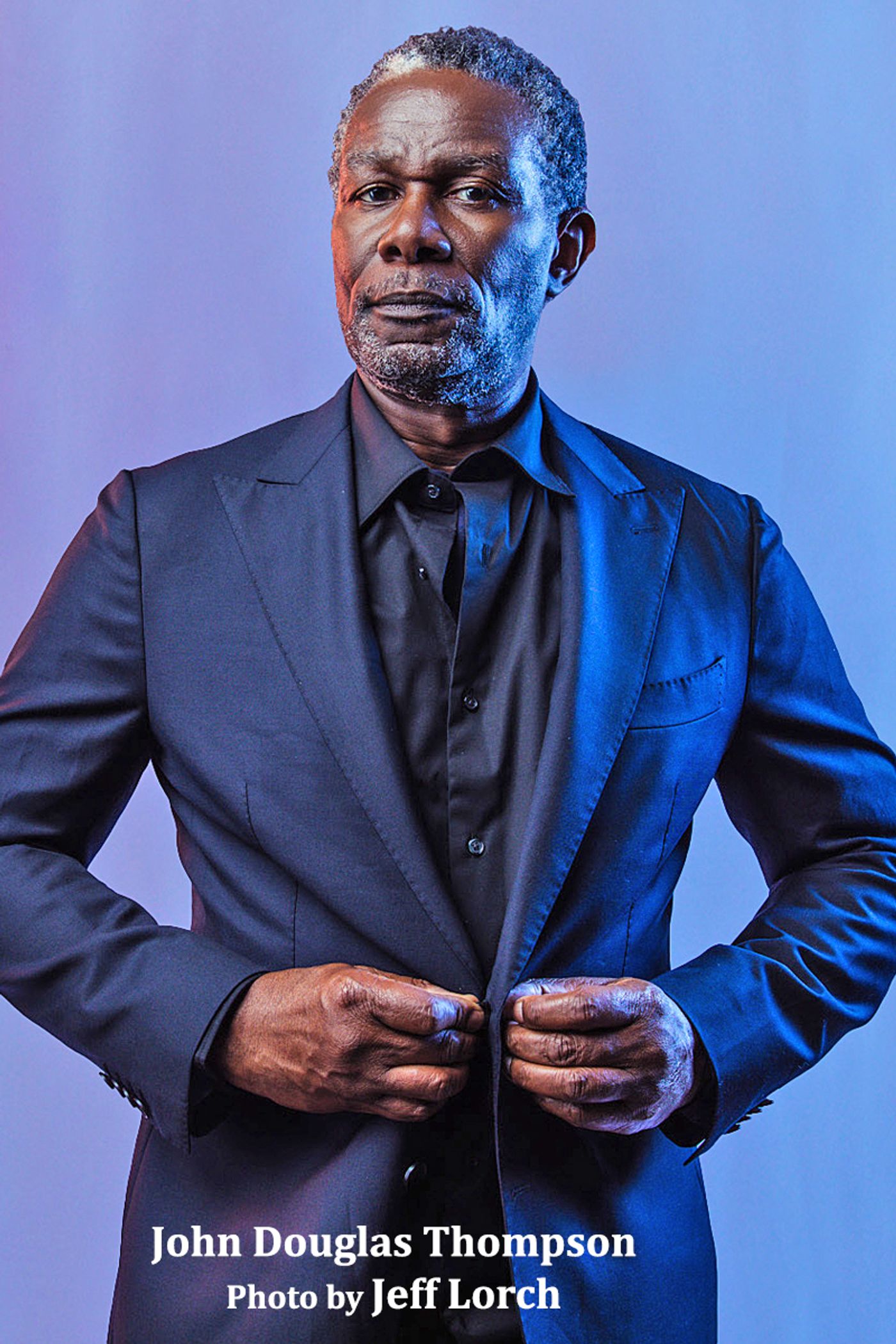 Continued success with the rest of your run and your extension.
Continued success with the rest of your run and your extension.
I'm so glad we got to make up for the shows that we've lost. The audiences seem to be great. They seem to be into the show. and very focused and understanding the contemporary nature of this old kind of classical American warhorse of a play. But it has such contemporary relevance, and they get it right off the bat. So that's great. It feels like theater as activism.
Thank you again, John Douglas! It was a real pleasure experiencing your Matthew Harrison Brady and company.
For tickets to the live performances of Inherit the Wind through December 3, 2023; click on the button below:
Videos

